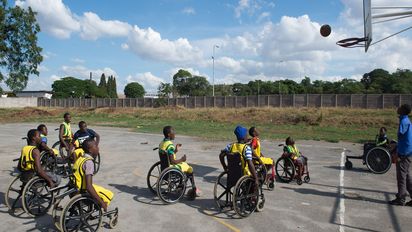
Everyone Needs to Be Included
More than one billion people worldwide have a disability, one in eight of whom live in a developing country. Physical, mental or psychological impairment can be congenital or due to accident or illness.
While in Germany the number of people with disabilities increases with age, in poor countries many children and young adults are also affected – above all due to lack of healthcare and unhealthy living conditions. Long-term disabilities also result from war and natural disasters.
Doubly Disadvantaged
Persons with disabilities are usually among the poorest of the poor, particularly in developing countries. They are often excluded, rejected and stigmatised. In poor countries only 10 percent of children and young people with disabilities go to school, and few of these go on to higher education.
Adults with disabilities, too, are denied participation in social life, cannot find jobs and cannot contribute to their own or their families' livelihood - although they could if they received support.
Inclusion from the Start
The UN Convention on the Rights of Persons with Disabilities states that persons with disabilities “include those who have long-term physical, mental, intellectual or sensory impairments which in interaction with various barriers may hinder their full and effective participation in society on an equal basis with others”. When persons with disabilities are disadvantaged, it is due less to their individual impairments than to the way society reacts to them by building barriers. For Brot für die Welt (Bread for the World), the goal is an inclusive society in which, right from the start, persons with and without disabilities live and live together independently and fully.
An inclusive society respects the diversity of people with their talents and limitations while focusing on their abilities. It also asks what resources they need to enable their equal participation. Inclusion of persons with disabilities brings greater benefits for all: A level entryway benefits people with baby carriages or walkers equally. Only in an inclusive society can persons with disabilities bring their talents to bear and live independently.
What Brot für die Welt Does
Brot für die Welt plans “inclusive” projects with its partner organisations, a theme which cuts across all our programmes. The whole community - including persons with disabilities - should benefit equally from development processes. Only with disability-inclusive development can poverty be combated and human rights realised.
Brot für die Welt encourages its partner organisations to achieve accessibility, for example through a barrier-free website, and thus to break down prejudices on the parts of all involved. For example, the partner organisation Ecumenical Disability Advocates Network influences churches and ecumenical organisations so that church congregations, pastors and bishops do not exclude persons with disabilities but fully integrate them. Persons with disabilities, like everyone else, should be able to work as employees and volunteers. Moreover they should be actively involved in all decisions that affect them: “Nothing about us without us.” Brot für die Welt is committed to ensuring that government development co-operation also treats disability as a mainstreaming issue.
